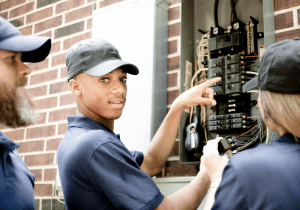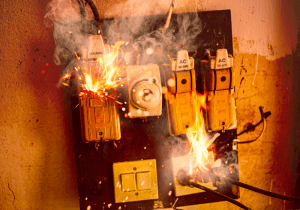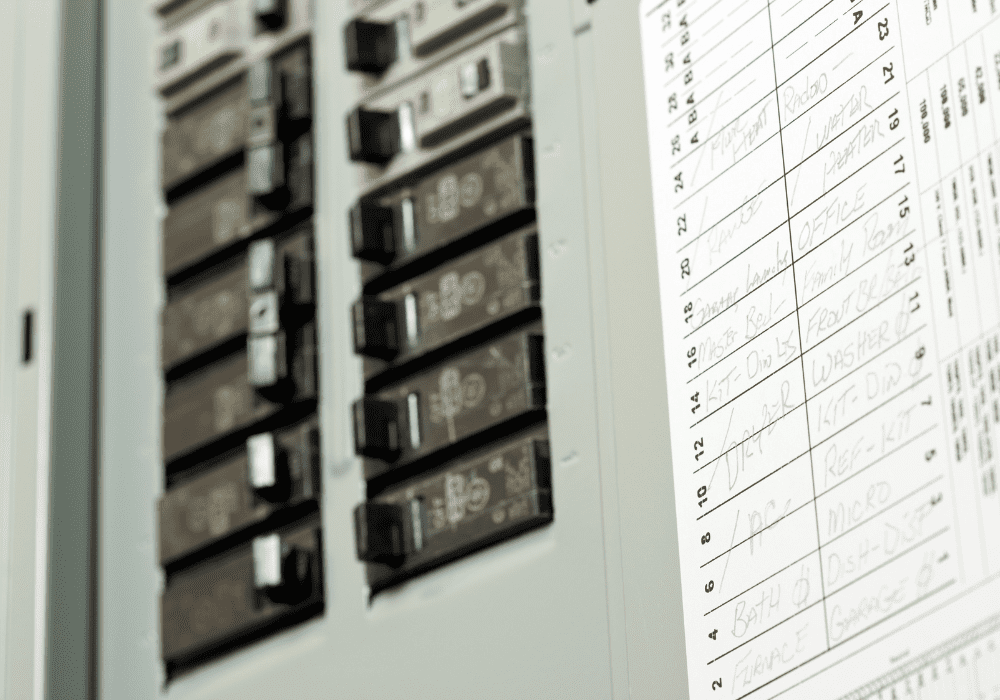Your home’s electrical panel, also known as a “breaker box” or “fuse box”, is an essential component of your home’s electrical system. It acts as the central hub for all electricity entering your home and distributes it to various circuits throughout your house. Understanding how your electrical panel works and its components is crucial for ensuring the safety and efficiency of your home’s electricity. In this guide, we’ll take a deep dive into understanding your home’s electrical panel, including its purpose, signs it may be outdated, and when to upgrade.
 What is an Electrical Panel?
What is an Electrical Panel?
An electrical panel is a metal box that holds circuit breakers or fuses, which control the flow of electricity to different parts of your home. Think of it as the central hub that ensures each area gets the right amount of power.
Anatomy of an Electrical Panel
Inside the panel, you’ll find a main breaker that controls the overall electrical supply and individual breakers that manage specific circuits. These breakers are designed to trip and shut off power if there’s an overload, preventing potential hazards like fires.
Types of Electrical Panels
There are two main types of electrical panels—circuit breaker panels and fuse boxes. Circuit breaker panels are more common in modern homes and offer the convenience of simply resetting a tripped breaker. Fuse boxes, found in older homes, require replacing blown fuses.
Why It Matters
Understanding the components and functions of your electrical panel helps you troubleshoot issues more effectively. It also prepares you to discuss any concerns with a professional, ensuring you get accurate advice and service.
Signs Your Home’s Electrical Panel Needs Attention
Your electrical panel may give you subtle hints that something isn’t right. Ignoring these signs can lead to bigger problems down the line.
Frequent Breaker Trips
If your breakers trip often, it could indicate an overloaded circuit or a more serious issue like a short circuit. While occasional trips might be normal, frequent occurrences are a red flag.
Burning Smell or Scorch Marks
A burning smell or scorch marks around your home’s electrical panel are immediate causes for concern. These signs suggest overheating, which can lead to electrical fires if not addressed promptly.
Flickering or Dimming Lights
Lights that flicker or dim without reason could be a symptom of an overloaded panel or faulty wiring. This inconsistency in power flow requires immediate attention to prevent further complications.
The Dangers of an Outdated or Inadequate Electrical Panel
Using an outdated or inadequate electrical panel presents various risks that could jeopardize your home’s safety.
 Fire Hazards
Fire Hazards
Old panels may not handle the electrical demands of modern appliances, leading to overheating and potential fires. This is particularly true for homes still using fuse boxes.
Appliance Damage
An inadequate electrical panel can cause power surges, damaging your expensive appliances. Replacing damaged appliances often costs more than upgrading your home’s electrical panel.
Safety Risks
An outdated panel may lack safety features found in newer models. This increases the risk of electrical shocks or other dangerous incidents in your home.
Upgrading Your Home’s Electrical Panel: When and How
Knowing when to upgrade your electrical panel can save you from future headaches and potential dangers.
When to Upgrade
If your home still uses a fuse box, it’s time for an upgrade. Additionally, if your panel is over 20 years old or you’ve added new appliances and it’s struggling to keep up, consider an update.
How to Upgrade
Hiring a licensed electrician is crucial for upgrading your electrical panel. They will assess your current system, recommend the appropriate capacity, and ensure everything complies with codes and regulations.
Benefits of Upgrading
Upgrading your home’s electrical panel not only enhances safety but also increases your home’s value. A modern panel can handle higher electrical loads, allowing you to enjoy all your appliances without worry.
Understanding your electrical panel is crucial for maintaining a safe and efficient home. By recognizing signs of wear, knowing when to upgrade, and performing basic maintenance, you can prevent potential hazards. If you’re unsure about any aspect of your home’s electrical panel, don’t hesitate to contact a professional. Investing in your home’s electrical safety is always worth it.

